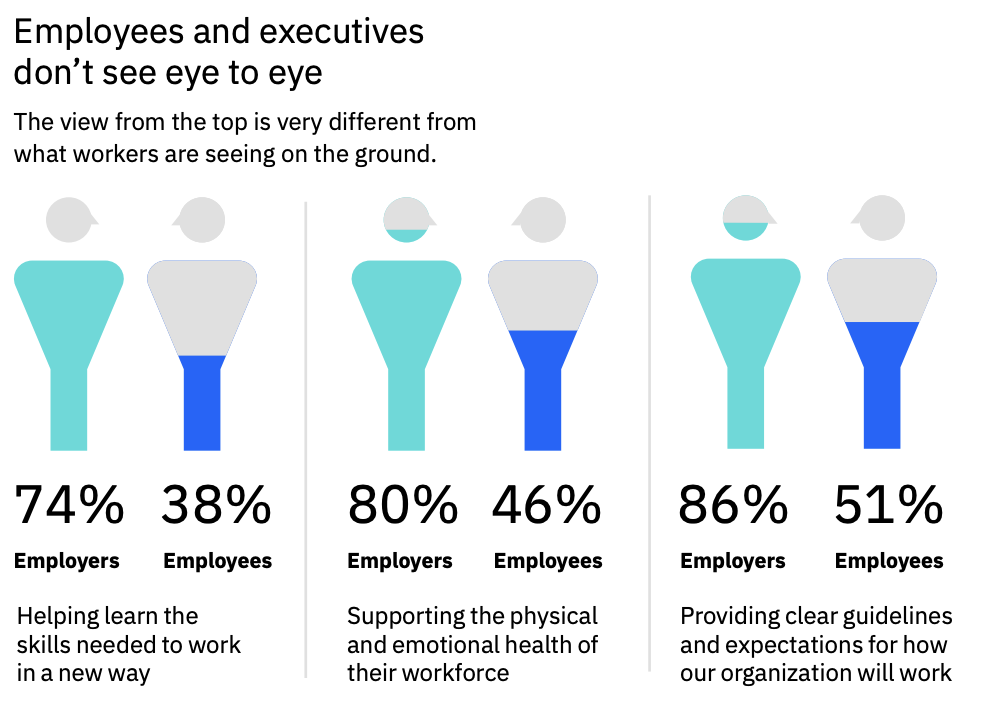Smarter Strategies
Insights and best practices for digital transformation
On the Fast Track to Digital Transformation, Businesses Must Help Their People Keep Up
September 30, 2020
By Mark Foster
The global pandemic has forced businesses to speed up their digital transformation. To continue serving their customers in the era of social distancing and supply-chain disruptions, companies have had to improve their flexibility, streamline their processes and make real-time decisions amid constant and hard-to-predict market fluctuations. They have increasingly adopted technologies like cloud, AI and automation to make that happen.
In fact, 6 in 10 organizations have accelerated their digital transformation during the pandemic, and two-thirds have completed technology initiatives that had previously encountered resistance, according to new research from IBM.
Now, this sense of urgency needs to carry over to any company’s most valuable assets—its people—as the users of that technology.
In its new research, on COVID-19 and the future of business, IBM surveyed more than 3,800 C-Suite executives in 20 countries and 22 industries. We found that even as companies have rushed to adopt the technologies necessary not only to survive but thrive as business enterprises, too many of their employees feel stressed and even overwhelmed. And executives recognize the problem: They reported that employee burnout, inadequate skills and organizational complexity are their biggest hurdles to progress today and in the next two years.
It’s one thing to nimbly retool and modernize the workplace. It’s quite another proposition to expect workers to quickly adjust to the upheaval in their lives and livelihoods. In a companion IBM survey of everyday people, too many said they feel their mental health has suffered in the time of COVID-19. And they don’t think their bosses are doing enough to help them navigate these challenges.
Our executive survey indicates those workers are right: There is a gaping chasm between what executives think they are offering their employees and how those employees feel.

Executives recognize that their employees have been under intense pressure, and they contend that employee well-being is among their highest priorities. Seventy four percent of executives think they have been helping their employees learn the skills needed to work in a new way. And yet, only 38 percent of employees agree with that.
About 80 percent of employers, meanwhile, say they are supporting the physical and emotional health of their workforce. So why do only 46 percent of employees feel that support?
Empowerment and Empathy
Many employees are being asked to innovate amid challenges of a kind they’ve never seen before, including massive spikes and dips in consumer demand caused by the pandemic. The move to remote work can also undermine the personal connections that help define many corporate cultures. And the quality and reliability of work-from-home tools may lag significantly behind people’s needs.
Executives expect to place more emphasis on internal and operational capabilities over the next two years, such as increasing prioritization of workforce safety, skills, flexibility.
That’s good news because now, more than ever, executives need to focus on two critical areas on behalf of their people: processes and technology tuned to empower the people who use them; and empathetic, transparent leadership.
Leaders need to listen closely to what their workers need in terms of digital tools to be productive and serve customers well in this environment—and to actually provide those tools.
Nationwide Building Society, Britain's biggest mutual financial institution, has been supporting their frontline teams with a virtual agent—Arti—that can answer common customer questions. As well as handling over 10,000 online chat queries, Arti freed up hundreds of hours for Nationwide employees to deal with more complex queries from the society’s members during these difficult times.
And then there’s the personal element. Many employees are trying to oversee their children’s education at home because many schools are closed or operating virtually. These employees in particular need flexibility, and need support to stay engaged and productive while also dealing with the larger social disruption that has forced many of them, particularly women, to take on two full-time jobs simultaneously.
One idea that’s taken hold at IBM is our company-wide “work from home” pledge. This started from a grassroots initiative of IBMers listening to colleagues with empathy and the desire to make work (and life) a bit easier. The pledge reassures—and reminds—everyone that working remotely requires flexibility, adaptability and compassion.
A flexible organization that can transform itself quickly during the next crisis requires building trust and confidence among employees. How they are treated now will have an outsize impact on perceptions and value in the future. Clearly, there is massive opportunity for leaders who can get this right, when most seem to be struggling.

Mark Foster is Senior Vice President of IBM Services.